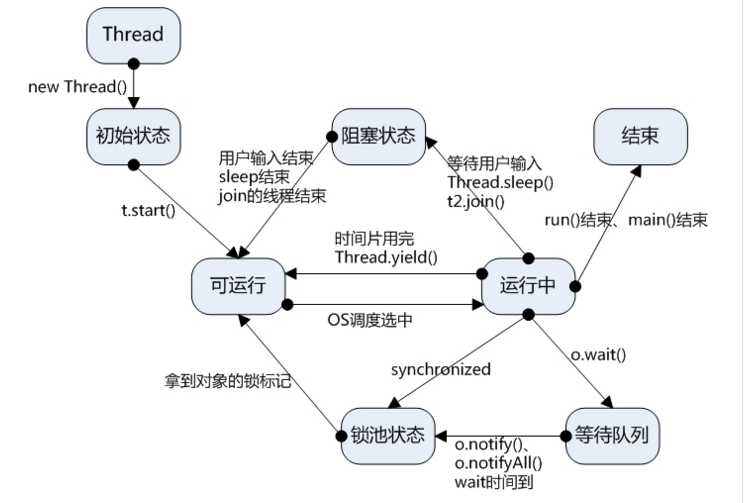Java多线程学习
Posted
tags:
篇首语:本文由小常识网(cha138.com)小编为大家整理,主要介绍了Java多线程学习相关的知识,希望对你有一定的参考价值。
首先讲一下进程和线程的区别:
进程:每个进程都有独立的代码和数据空间(进程上下文),进程间的切换会有较大的开销,一个进程包含1--n个线程。
线程:同一类线程共享代码和数据空间,每个线程有独立的运行栈和程序计数器(PC),线程切换开销小。
线程和进程一样分为五个阶段:创建、就绪、运行、阻塞、终止。
多进程是指操作系统能同时运行多个任务(程序)。
多线程是指在同一程序中有多个顺序流在执行。
在java中要想实现多线程,有两种手段,一种是继续Thread类,另外一种是实现Runable接口。
一、扩展java.lang.Thread类
package com.hanqi.test; public class Thread1 extends Thread { private String name; public Thread1(String name) { this.name = name; } public void run() { for (int i = 0; i < 5; i++) { System.out.println(name + "运行" + i); } try { sleep((int) Math.random() * 10); } catch (InterruptedException e) { e.printStackTrace(); } } public static class Main { public static void main(String[] args) { Thread1 t1 = new Thread1("A"); Thread1 t2 = new Thread1("B"); t1.start(); t2.start(); } } }
输出:
B运行0
B运行1
B运行2
B运行3
B运行4
A运行0
A运行1
A运行2
A运行3
A运行4
再运行一次:
A运行0
B运行0
A运行1
B运行1
A运行2
B运行2
A运行3
B运行3
A运行4
B运行4
但是start方法重复调用的话,会出现java.lang.IllegalThreadStateException异常。
public static class Main { public static void main(String[] args) { Thread1 mTh1=new Thread1("A"); Thread1 mTh2=mTh1; mTh1.start(); mTh2.start(); } }
输出:
Exception in thread "main"
A运行0
A运行1
A运行2
A运行3
A运行4
java.lang.IllegalThreadStateException
at java.lang.Thread.start(Thread.java:705)
at com.hanqi.test.Thread1$Main.main(Thread1.java:26)
二、实现java.lang.Runnable接口
package com.hanqi.runnable; class Thread2 implements Runnable { private String name; public Thread2(String name) { this.name = name; } @Override public void run() { for (int i = 0; i < 5; i++) { System.out.println(name + "运行 : " + i); try { Thread.sleep((int) Math.random() * 10); } catch (InterruptedException e) { e.printStackTrace(); } } } } public class Main { public static void main(String[] args) { new Thread(new Thread2("C")).start(); new Thread(new Thread2("D")).start(); } }
输出:
C运行 : 0
D运行 : 0
C运行 : 1
D运行 : 1
C运行 : 2
D运行 : 2
C运行 : 3
D运行 : 3
C运行 : 4
D运行 : 4
三、Thread和Runnable的区别
如果一个类继承Thread,则不适合资源共享。但是如果实现了Runable接口的话,则很容易的实现资源共享。
package com.multithread.learning; /** *@functon 多线程学习,继承Thread,资源不能共享 *@author 林炳文 *@time 2015.3.9 */ class Thread1 extends Thread{ private int count=5; private String name; public Thread1(String name) { this.name=name; } public void run() { for (int i = 0; i < 5; i++) { System.out.println(name + "运行 count= " + count--); try { sleep((int) Math.random() * 10); } catch (InterruptedException e) { e.printStackTrace(); } } } } public class Main { public static void main(String[] args) { Thread1 mTh1=new Thread1("A"); Thread1 mTh2=new Thread1("B"); mTh1.start(); mTh2.start(); } }
输出:
A运行 count= 5
B运行 count= 5
B运行 count= 4
A运行 count= 4
B运行 count= 3
A运行 count= 3
B运行 count= 2
A运行 count= 2
B运行 count= 1
A运行 count= 1
从上面可以看出,不同的线程之间count是不同的,这对于卖票系统来说就会有很大的问题,当然,这里可以用同步来作。这里我们用Runnable来做下看看
package com.multithread.runnable; class Thread2 implements Runnable{ private int count=15; @Override public void run() { for (int i = 0; i < 5; i++) { System.out.println(Thread.currentThread().getName() + "运行 count= " + count--); try { Thread.sleep((int) Math.random() * 10); } catch (InterruptedException e) { e.printStackTrace(); } } } } public class Main { public static void main(String[] args) { Thread2 my = new Thread2(); new Thread(my, "C").start();//同一个mt,但是在Thread中就不可以,如果用同一个实例化对象mt,就会出现异常 new Thread(my, "D").start(); new Thread(my, "E").start(); } }
输出:
C运行 count= 15
E运行 count= 13
D运行 count= 14
D运行 count= 12
C运行 count= 11
E运行 count= 11
D运行 count= 10
C运行 count= 9
D运行 count= 8
E运行 count= 7
C运行 count= 6
D运行 count= 5
E运行 count= 4
C运行 count= 3
E运行 count= 2
这里要注意每个线程都是用同一个实例化对象,如果不是同一个,效果就和上面的一样了!
总结:
实现Runnable接口比继承Thread类所具有的优势:
1):适合多个相同的程序代码的线程去处理同一个资源
2):可以避免java中的单继承的限制
3):增加程序的健壮性,代码可以被多个线程共享,代码和数据独立
提醒一下大家:main方法其实也是一个线程。在java中所以的线程都是同时启动的,至于什么时候,哪个先执行,完全看谁先得到CPU的资源。
在java中,每次程序运行至少启动2个线程。一个是main线程,一个是垃圾收集线程。因为每当使用java命令执行一个类的时候,实际上都会启动一个JVM,每一个jVM实习在就是在操作系统中启动了一个进程。
四、线程状态转换

五、线程调度
线程的调度
以上是关于Java多线程学习的主要内容,如果未能解决你的问题,请参考以下文章